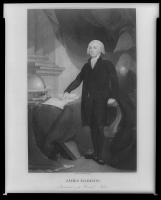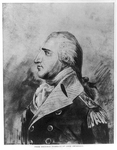Posted on July 4, 2005
Definiphobia
Liberals fear the meaning of patriotism
by
Daniel Clark
One of the ways in which liberals try to escape from reality is to ask what something means, and then pretend that there is no answer. The problem with this method is that it's so transparent. When an English professor walks in on the first day of class and writes on the chalkboard, "What is literature," his students can already guess that he'll have them analyzing Bazooka Joe before the semester is over. When USA Today ran a June 29th article that posed the question, "What is patriotism," the outcome was equally predictable.

The two-page Life section feature takes only six paragraphs to get around to the grotesque moral equivalence that becomes its theme. "Some people religiously salute the flag; some wrap themselves in the flag -- literally. Others burn it and say patriotism is about protest." Never does the article suggest that those others might be wrong. But then, you've probably already deduced that from its snide remarks about people who take pride in America. (Have you ever actually seen someone literally wrap himself in the flag?) In order to raise disloyalty to the level of patriotism, one must also lower patriotism on the other end of the pulley. To put it another way, as long as loyal Americans are portrayed as mindless fools, how bad can a flag-burner be?
The author of the piece, Janet Kornblum, breaks patriotism down into three categories: devout patriotism, which she notes is also referred to as "blind patriotism"; symbolic patriotism, which she describes as "attachment to symbols and rituals, such as the flag and patriotic songs"; and constructive or critical patriotism (like "constructively" burning an American flag, for instance). Only this last category does she present as if it has any rational basis.
"Increasingly these days," the article moans, "disagreement leads to arguments and accusations of others being unpatriotic." Princeton professor Nolan McCarty concurs. "What's newer and more divisive is that people often take it a step further," he says. "Not only do they assert that their idea is patriotic, but they discredit other ideas by suggesting those ideas are not in the best interest of the country."
The obvious point that there are ideas that are not in the best interest of the country is never brought up. It's as if the very idea of someone being unpatriotic is so far outside the bounds of acceptable discourse as to be comparable to racial or religious bigotry.
According to an accompanying Gallup poll, 94.5 percent of Americans say they are at least "somewhat patriotic." This means that 5.5 percent of respondents are unpatriotic people who are at least honest enough to admit it. Many others are like Ethel-Anne Roome of Connecticut, one of the "critical patriots" quoted in a segment of the article labeled, "Tradition of 'patriotic dissent'."
Roome tells USA Today, "Patriotism implies one's devotion to one's country. Am I devoted to my country? Yes, I am devoted to the ideals of the Constitution." As verbal gymnastics go, this is a well-executed double-balderdash. For starters, patriotism is one's devotion to one's country. It doesn't just "imply" that. Second, if Roome were devoted to the Constitution, she could have simply said so. We don't know what she thinks its "ideals" are. Some liberals will argue that the "ideals" of the Constitution directly contradict what that document says.
A couple lines later, she asks herself, "Am I proud to be an American?" Her answer: "No. I am ashamed of the path we have taken to war." That hardly suffices as an explanation, because foreign policy disagreements do not directly translate into a lack of pride in one's country. After all, Francis Scott Key disapproved of the War of 1812, but was still moved to write The Star-Spangled Banner by the American soldiers' heroic defense of Fort McHenry. The mantra of today's dissenters is that they "support the troops" while opposing the war, but you don't see them writing songs in celebration of American military heroism.

If we were to disagree with Roome and inform her that she's being unpatriotic, the people at USA Today would surely frown on us. Like the professor says, calling someone unpatriotic is divisive. Moreover, it's new! Never, until this new, intolerant age of ours, have people lacking pride in their country been called unpatriotic. In politically correct mushspeak, Roome is just a different kind of patriot. You know, the kind of patriot who is ashamed of her country. Sure, it's a contradiction, but that's what makes "critical patriots" complex, unlike those simple-minded "devout" and "symbolic" patriots whose devotion to America is unambiguous.
Where Kornblum's categorization falters is in separating these "constructive or critical patriots" from the flag-draped caricatures she draws, because those are actually the same people, presenting themselves to different audiences. We get a glimpse of this pattern from Roome's answer. First, she tries to satisfy patriotic people by applying the word "patriotism" to herself, and then she assures unpatriotic people that she's ashamed to be an American. If this tactic of hers sounds familiar, it should, because it is today's Democratic Party in microcosm.
The 2004 Democratic National Convention was possibly the largest gathering of disloyal Americans since Woodstock, but the image that the party presented to the cameras was riddled enough with symbolic patriotism to make even Frank Capra retch. One speaker after another made a point of it to use the word "patriotic" or "patriotism" at least once. It was as if, in accordance with USA Today's anti-definition of the word, all one has to do is to call oneself and one's party "patriotic" in order to make it so.
John Kerry and his supporters were so over-the-top that they appeared to be spoofing patriotism in a bad liberal satire. Get me. I'm saluting! How patriotic is that? I saluted a lot in Vietnam. We patriotic Democrats are famous for our saluting. See this enormous flag hanging over my head? We call her "Old Glory." You people watching at home probably didn't realize that, but we patriotic Democrats call her "Old Glory" every day, when we salute her. Old Glory doesn't belong to any ideology; she belongs to us all, so don't question our patriotism, in case you were thinking of doing so, although I can't imagine why. Say, have I introduced you to my "band of brothers"?
Behind this facade of symbolic patriotism stood a Democratic Party that was at the same time giving anti-American propagandist Michael Moore a place of honor at its convention, advocating the subordination of the American military to foreign and often unfriendly governments, and nominating a presidential candidate with a history of disloyalty to his country. The John Kerry who took the convention stage saluting and pitching woo to Old Glory was the same John Kerry who had slandered his fellow soldiers as war criminals, secretly met with Vietcong "terrorists" (his word) in Paris, and co-authored a book whose cover featured a bunch of hippies mocking our soldiers at Iwo Jima, while flying the American flag upside-down.

If the point of the USA Today article had really been to define patriotism, and it didn't occur to the author to look the word up, then the least she could have done was give an example of what it's not. Instead, it seems that all Michael Moore would have to do is put on a hat that says, "I am a patriot," and the paper would acknowledge him as a "patriotic dissenter." That's because the entire point of asking "what is patriotism" is to expand the expand the word beyond its true definition, so that those things that lie outside of it can be given cover.

There's one critical flaw in that strategy, however, in that almost everyone already knows what the word "patriotism" means. It's a commonly used word that has a specific meaning, which cannot be arbitrarily applied to just anything.
A man cannot talk his way onto a lifeboat by asking the question, "What are women and children," and then saying that he, in his own way, is a woman or a child, because anybody can see that he's not. In order to sell the idea, he'll have to put on a propeller beanie, or squeeze into a girdle, and start actually playing the part.
Likewise, unpatriotic Americans who don't want to be known as such have got to declare loyalty to our flag and our Constitution. Unable to alter the meaning of patriotism, they have to find superficial ways of conforming to it, or else live with the reputations they deserve. Now they find themselves posing as the very thing they despise, and all because one stubborn word refuses to bend to their demands. It's not all bad news for them, though. At least now they get to add the English language to their long list of things they hate about our country.
The Shinbone: The Frontier of the Free Press
Mailbag . Issue Index . Politimals